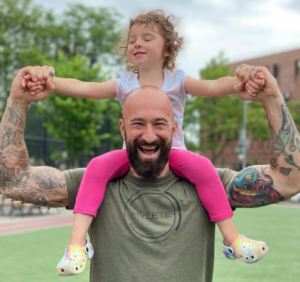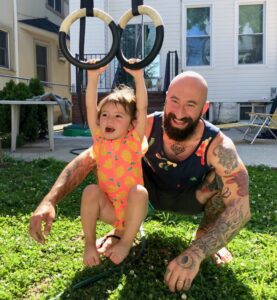
One of the greatest joys in my life is watching my daughter discover the world. It’s amazing to observe her as she figures out how to perform physical tasks and solve problems. And while it is tempting to try to explain everything to her based on my experience, I think it is generally best for her to learn from her own personal trials and errors. I try not to intervene unless she asks for my help or I feel her safety may be in jeopardy.
My job as a personal trainer is actually pretty similar: I aim to impart only the most essential information to my clients and I do my best to let them make their own discoveries and form their own conclusions. I’m there to guide the process, but they have to do the work in order to unlock their physical potential.
The similarities do not end there, however. Many of the lessons that come up in child rearing are also applicable to the world of exercise. That’s right – there’s a lot you can learn about fitness from a baby.
Though you may still ultimately need to ingrain these lessons from your own firsthand experience, it can help to keep them in mind when you’re starting (or restarting) a fitness regimen.
Heck, I still need to remind myself of these things on a regular basis, even though I’ve been working out for over 30 years.
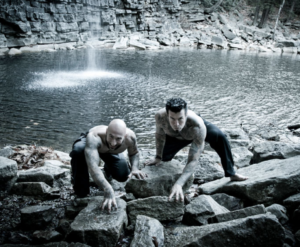
1 – Crawl Before You Walk
One of my biggest gym pet peeves is watching someone attempt an exercise that they’re clearly not ready for.
It’s silly to try doing weighted pull-ups if you can’t do them properly without additional weight.
Similarly, if you can barely get to parallel depth on an unloaded squat, you probably shouldn’t try one with 200+ pounds on the bar.
Just like a baby must learn to crawl before they walk, it’s absolutely essential to master the basics before trying to progress them.
And just like that baby will need a lot of practice in order to graduate from crawling to walking, don’t expect to move past the basics until you’ve worked on them thoroughly and consistently for several months, or even years.
If you suspect you may be guilty of rushing ahead, try lowering the resistance on your exercises and instead focus on doing every rep with a full range of motion and complete control of the movement.
It’s okay to make this mistake when you’re new to the gym and eager to get in shape, but it can quickly become a problem if you don’t check your ego at some point.
Which brings us to our next lesson…
2 – Learn From Your Mistakes
There’s this song that my 2 year old likes called “Five Little Monkeys Jumping on the Bed.” The song is about these monkeys who keep jumping up and down on the bed, then falling off and bumping their heads.
Their mother keeps calling the doctor, who gives the same advice every time: “No more monkeys jumping on the bed!”
The mother apparently ignores the doctor’s advice and eventually, one by one, all the monkeys have fallen off the bed and gotten injured.
Some of my clients do the same thing: They come to me for help, and I give them clear, actionable (and oftentimes obvious) advice.
Afterwards they disregard what I tell them and keep doing the same thing they have always done. Then they continue to ask me the same questions, bewildered as to why they aren’t seeing any changes.
The song is actually a profound allegory for human behavior.
If we do not learn from our mistakes, we will be doomed to repeat them.
So stop jumping on the bed and go to sleep already, otherwise you’re just going to keep bumping your head.
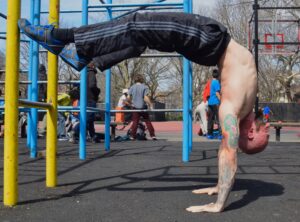
3 – Train Your Posterior Chain
People often tend to focus on the muscles we see in the mirror. There is a reason why there are twice as many articles about how to train your chest, arms or abs as there are about training your lower back.
Unfortunately this obsession with “mirror muscles” often causes folks to develop asymmetrical imbalances that can result in poor posture, faulty movement mechanics or even injuries.
When you become a parent, you learn about something called “tummy time” which refers to placing your baby face down on their tummy for short periods of time. This helps the baby learn to engage their back muscles in order to lift their head and strengthen their posterior chain.
It’s an important part of a baby’s development that’s well supported in the pediatric community.
As adults, however, it is not any less important to work our spinal erectors. Back bridges, supermans, hyperextentions and deadlifts are all great choices.
Don’t be a baby about training your back.
4 – Deep Squats Are Natural
One of the first exercises I usually teach a new personal training client is the squat. During these early sessions, it’s pretty common for people to tell me the movement feels strange or unnatural.
Ironically, children tend to instinctively land in a squat when they lose their balance, and in many parts of the world, people of all ages eat, rest and poop while in a deep squat instead of sitting. Deep squatting is actually one of the most natural human movement patterns that exists.
Unfortunately, in Western society we spend so much of our lives in chairs, couches and cars that this universally natural human movement pattern can begin to feel unnatural over time.
If squatting feels uncomfortable to you, you probably just need to get reacquainted with it.
Start with brief holds throughout the day, and grab onto a sturdy object if you need to in order to stay balanced with your feet flat on the ground. It may be unpleasant at first, but if you practice consistently you will quickly learn to reclaim your squat.
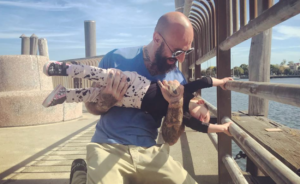
5 – Follow Your Curiosity
Kids have a hard time sitting still. They love to run, jump, skip and climb – but not because it’s good exercise. They do it because it’s fun!
The human body has a built in rewards system that gives us feel-good chemicals like endorphins, serotonin and dopamine when we engage in physical activities. So if you’re having a tough time getting motivated to work out, try to remember how good you will feel afterwards.
Kids also love variety, so if the same old routine you’ve been doing for ages has gotten boring, it might help to try doing something different. Mixing up your training keeps things interesting, and you may even discover something new that excites you.
You’ll know you’ve found something good when your training stops feeling like a chore, and starts making you feel like a kid again.
